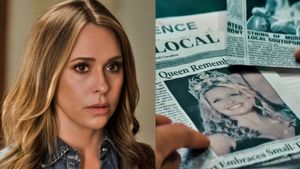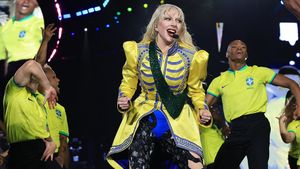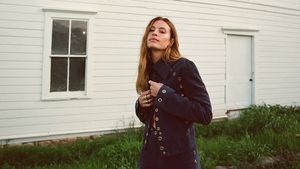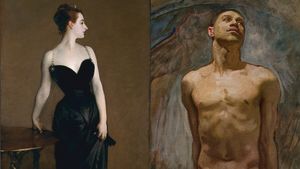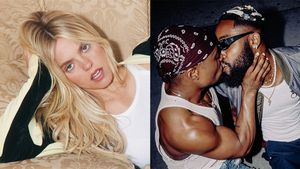Marilyn Monroe will always be the blueprint many women and queer people look to when it comes to glamour and Old Hollywood beauty. She was a talented actor, a brave performer, and one of the most desired women of her time. And now, Ana de Armas will forever be a part of her legacy.
De Armas stars as Norma Jeane — better known to the world as Marilyn Monroe — in director Andrew Dominik’s film Blonde, based on the book by Joyce Carol Oates that presents a fictionalized take on the star’s life. It’s one of the best movies of the year, and the best performance of the already talented actor’s career thus far. (She's ready for her Academy Award!)
In the film, de Armas gives one of the most powerful acting performances put on camera in the last decade. Her joy and pain are palpable, her trauma is laid bare on the screen, and she brings Marilyn back to life in her full glory and, more importantly, her full humanity.
Blonde doesn’t just show us the power that Monroe had as a person, it also allows de Armas to flex her acting skills, standing in for Monroe in some of her most famous roles. It’s a layered performance where every layer is more moving and evocative than the last.
While some parts of the film might be hard to watch for some viewers, it truly is a great accomplishment in cinema. It’s unflinching and sears itself into your memory, and a lot of that is because of de Armas’ performance.
BLONDE | From Writer and Director Andrew Dominik | Official Trailer | Netflixwww.youtube.com
De Armas says it was an honor to portray Monroe, and to get the chance to become a part of her legacy as an LGBTQ+ icon.
“She was very inspiring. And the more I learned about her, the more I studied, the more I understood what was going on and what she went through, the more respect I felt for her,” de Armas tells us. “Just so much more empathy, and understanding, and self-evaluation of everything as a woman in the industry, and same age [as me], same everything. A lot of things I didn't even think we had in common.”
She also says it was one of the great challenges of her career to try to step into the shoes of a person who has become synonymous with femininity and womanhood over the last century.
“She was incandescent, she was so special. You can't copy that, you can't replicate that, but you can enhance it by, I thought, giving her an emotional truth, another layer underneath the character who was the woman,” de Armas says. “I felt like she could never live up to Marilyn herself. It was very heartbreaking, and also beautiful, and so complex, and so interesting.”
While Blonde focuses a lot on the negative relationships Monroe had with men, including President John F. Kennedy and former New York Yankees baseball player Joe DiMaggio, the movie also shows Monroe in one relationship that did seem to make her happy (at least for a little while): the one she shares with Charles Chaplin, Jr. and Ed Robinson, Jr., two sons of actors she dated together.
This is the only relationship in the movie that Marilyn can be Norma in, and it’s the queerest relationship in the movie. De Armas says that it was important to get to see Monroe explore to discover herself.
“As all young people, it's a time where you explore your sexuality and you learn,” she says. “And it's probably one of the happiest times in the movie where Norma actually felt seen, and that they loved her for who she was and they were not expecting anything else – quickly that changed, obviously, in the film. But for that time, she felt like she was being herself.”
De Armas says that even though the relationship helped Monroe feel free, that was soon stolen from her.
“It wasn't convenient for her career and for the studio, it's was not what they wanted for her,” she says of the throuple. “I think it's the time also in the film where you see the industry, and the studios, and the machine taking over and she was losing a little bit of her autonomy.”
She says the filming process changed her forever, and while she hasn’t directly seen Marilyn’s ghost recently, she’ll always feel her presence.
“Let's just say that people feel what they want to feel. And if you want to see something or you want to feel something and you're open to it you will. And if you're just shut down you won't,” she says about her comments that she was haunted by Monroe’s ghost while filming. “Since I did this film three years ago, I always think about her, always. Finally, this movie is coming out and I feel like I can just let it go and it's a big release, and now the world is going to see it. But for sure I don't think I will ever not think about her.”



